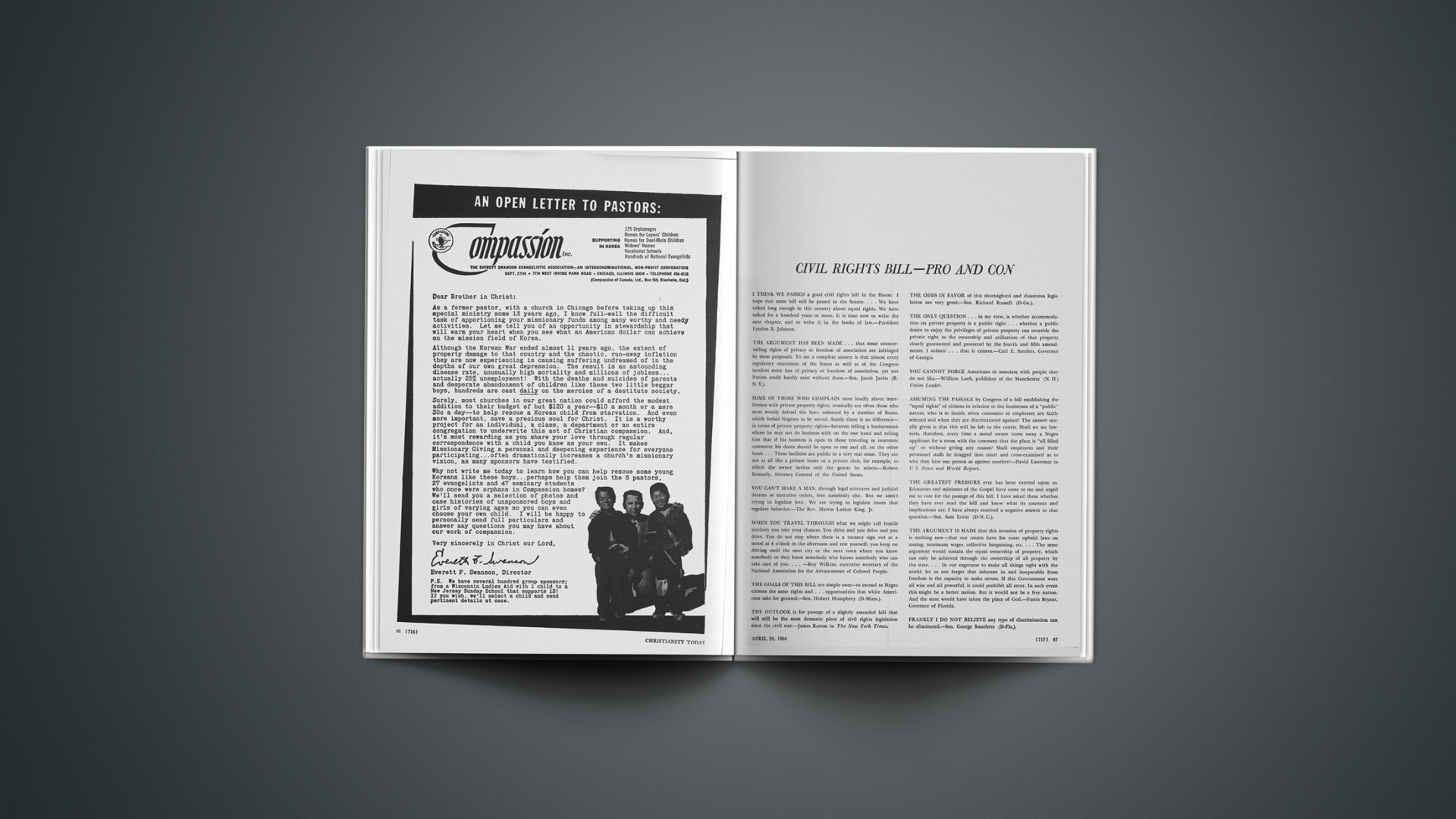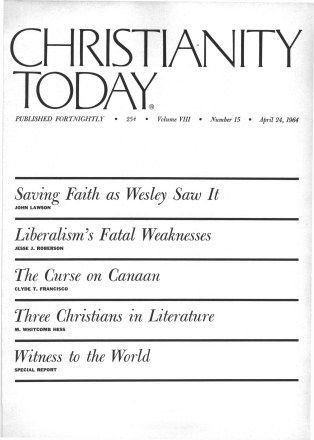I THINK WE PASSED a good civil rights bill in the House. I hope that same bill will be passed in the Senate.… We have talked long enough in this country about equal rights. We have talked for a hundred years or more. It is time now to write the next chapter, and to write it in the books of law.—President Lyndon B. Johnson.
THE ARGUMENT HAS BEEN MADE … that some countervailing rights of privacy or freedom of association are infringed by these proposals. To me a complete answer is that almost every regulatory enactment of the States as well as of the Congress involves some loss of privacy or freedom of association, yet our Nation could hardly exist without them.—Sen. Jacob Javits (R-N. Y.).
SOME OF THOSE WHO COMPLAIN most loudly about interference with private property rights, ironically are often those who most stoutly defend the laws, enforced by a number of States, which forbid Negroes to be served. Surely there is no difference—in terms of private property rights—between telling a businessman whom he may not do business with on the one hand and telling him that if his business is open to those traveling in interstate commerce his doors should be open to one and all, on the other hand.… These facilities are public in a very real sense. They are not at all like a private home or a private club, for example, to which the owner invites only the guests he selects.—Robert Kennedy, Attorney General of the United States.
YOU CAN’T MAKE A MAN, through legal strictures and judicial decrees or executive orders, love somebody else. But we aren’t trying to legislate love. We are trying to legislate issues that regulate behavior.—The Rev. Martin Luther King, Jr.
WHEN YOU TRAVEL THROUGH what we might call hostile territory you take your chances. You drive and you drive and you drive. You do not stop where there is a vacancy sign out at a motel at 4 o’clock in the afternoon and rest yourself; you keep on driving until the next city or the next town where you know somebody or they know somebody who knows somebody who can take care of you.…—Roy Wilkins, executive secretary of the National Association for the Advancement of Colored People.
THE GOALS OF THIS BILL are simple ones—to extend to Negro citizens the same rights and … opportunities that white Americans take for granted.—Sen. Hubert Humphrey (D-Minn.).
THE OUTLOOK is for passage of a slightly amended bill that will still be the most dramatic piece of civil rights legislation since the civil war.—James Reston in The New York Times.
THE ODDS IN FAVOR of this shortsighted and disastrous legislation are very great.—Sen. Richard Russell (D-Ga.).
THE ONLY QUESTION … in my view, is whether accommodation on private property is a public right … whether a public desire to enjoy the privileges of private property can override the private right to the ownership and utilization of that property clearly guaranteed and protected by the fourth and fifth amendments. I submit … that it cannot.—Carl E. Sanders, Governor of Georgia.
YOU CANNOT FORCE Americans to associate with people they do not like.—William Loeb, publisher of the Manchester (N. H.) Union Leader.
ASSUMING THE PASSAGE by Congress of a bill establishing the “equal rights” of citizens in relation to the businesses of a “public” nature, who is to decide when customers or employees are fairly selected and when they are discriminated against? The answer usually given is that this will be left to the courts. Shall we see lawsuits, therefore, every time a motel owner turns away a Negro applicant for a room with the comment that the place is “all filled up” or without giving any reason? Shall employees and their personnel staffs be dragged into court and cross-examined as to why they hire one person as against another?—David Lawrence in U. S. News and World Report.
THE GREATEST PRESSURE ever has been exerted upon us. Educators and ministers of the Gospel have come to me and urged me to vote for the passage of this bill. I have asked them whether they have ever read the bill and know what its contents and implications are. I have always received a negative answer to that question.—Sen. Sam Ervin (D-N. C.).
THE ARGUMENT IS MADE that this invasion of property rights is nothing new—that our courts have for years upheld laws on zoning, minimum wages, collective bargaining, etc.… The same argument would sustain the equal ownership of property, which can only be achieved through the ownership of all property by the state.… In our eagerness to make all things right with the world, let us not forget that inherent in and inseparable from freedom is the capacity to make errors. If this Government were all wise and all powerful, it could prohibit all error. In such event this might be a better nation. But it would not be a free nation. And the state would have taken the place of God.—Farris Bryant, Governor of Florida.
FRANKLY I DO NOT BELIEVE any type of discrimination can be eliminated.—Sen. George Smathers (D-Fla.).










